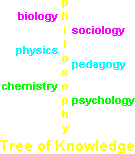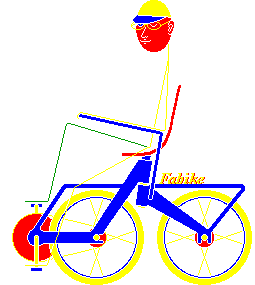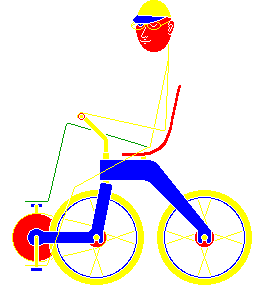
All sciences together can be pictured as a tree, with a branch for every science (often with side-branches).
Philosophy then is not just a branch but the stem of the tree including the roots.
All sciences talk of true knowledge about facts.
So questions for philosophy are:
First, good answers to these questions are needed, only then (philosophical) answers to more practical questions are possible.
About language
How important is language? We then first have to know what language is.
![]()
Most simple fact is a relation.
A word is the label we use to store an image in our memory (also see 'Numberlanguage' under 'Subsites').
label: bike
|
label: cycling
|
![]()

A bike only is bike for an earthly shaped human.
 |
||
What in the bolt-screwing-nut trinity plays between bolt and nut, so the screwing, is something we can understand and even feel. Maybe the working between proton and electron, so Electra, also is a kind of screwing but then a 3 dimensional screwing, or even 6 dimensional if you see left-turning and right-turning as different dimensions. The proton then could be a kind of 6-directional bolt-form (something like 6![]() 6) while the electron then, as a kind of nut, screws around one of these directions (something like
6) while the electron then, as a kind of nut, screws around one of these directions (something like ![]() ). 6
). 6![]() 6 /
6 / ![]() by the way happens to be 1836.12 and that also is the mass-relation between proton and electron.
by the way happens to be 1836.12 and that also is the mass-relation between proton and electron.
The positive charge of the proton then corresponds with the outer screw-thread on a bolt while the negative charge of the electron is like the inner screw-thread in a nut.
So maybe a beam of light is like a screwing. The beam does not travel through space then but only spins, screws. And the thinner the thread is (= the shorter the wavelength), the faster it spins (= the higher the frequency).
A message (photon) then is like a nut that does not spin itself, so that it moves along the screwing screw-thread of light. A material particle however spins itself, like being fixed in the field of light. A proton then is fixed inside the screwing while an electron spins on the outside. And it only is a simile of course.
|
|
The 'speed' of light anyhow is not an ordinary speed of a thing. The movement of the field of light according to me is the creating of finite space. Light is not travelling through space but is dynamic space.
In 1951 Einstein wrote that after 50 years of thinking he still did not understand the quantum. According to me, a quantum is not a smallest creation but a smallest creating. In terms of bolts and nuts, the quantum is not the bolt, not the nut, not even the screw-thread, but the idea behind the screw-thread. An idea that can realize itself.
We would call it intelligence then, in our robots for example. So the field of light is intelligence to me, even super-intelligence, able to adapt to circumstances, in the evolution of life but also on quantum level. We see intelligent adapting on quantum level.
The material by the way is only space, limited space. And it is the finiteness of our light that limits. The quantum then is the most fundamental activity of limiting. And this limiting is a creating, of finite space.
In terms of music; the field of light not only is waves but also melody (spirit) in the waves.
We also see this intelligence in nature and we call it physical laws. This intelligence however not only is passive but also active. In terms of music; not only the melody but also the musician, the composer.
When we use our intelligence to build things, we use inert material and that is why everything takes time for us. The super-intelligence of the field of light however does not need time, but makes time, creates its own material.
Are we able to measure this intelligence of the field of light? We can measure regularity in a sequence of tones or waves. But do we also measure (the beauty of) music then? No. Music exists, life exists, that is for sure. But the essence of these qualitative phenomena by definition transcends our quantitative comprehension. The products of this super-intelligence however can be experienced by us bodily, reality as a concert, with us as dancer, musician or just listener.
When we define the working of reality (screwing, Eros, Electra) as spirit, there also is room for spirit in physics.
Mankind did not like it, when science made clear that the earth is not the centre of the universe. To accept our naturalness demands an even bigger change. We have to see our mind as just a mean, language and science as just a mean, economics as just a mean and not the end. We have to accept the truth that bodily joy (or softening the pain) is the only thing we really want. We have to accept that we are no creators but just dis-coverers. Humbleness, that is what we need, towards nature.
This humbleness also is needed to accept this relational view. What you need then is belief, in the sense of knowing that not everything can be understood, music for example. Nevertheless we experience a truth when we experience music or life, not a scientific truth and therefore only a belief, a trust. And that is exactly why we enjoy, incomprehensible truth.
Our knowledge, our awareness, can be seen as an onion, with on the outside our scientific knowledge, of for example the shoe. To really understand the shoe however, you have to walk on it, to really fit and experience the form. And in the heart, we then find joy, nice fitting. And that is what we really want.
We in the West have turned the onion of knowledge inside out, and think that our scientific knowledge is about the heart, while belief and joy are only superficial; and that is the world upside down.
I also mean this: Real understanding of the bolt-nut-couple (or the shoe), means understanding the Why of it, the purpose. In the same way, real understanding of the proton-electron-couple means understanding the Why of it. Sciences like physics (now) only describe the How of these workings. But that is not enough I think.
When you believe, in this super-intelligence, then you are no longer alone. You can think about this super-intelligence like thinking about a father, the source of your own intelligence.
I strongly believe that, when we all simply wish, we can change this hell into a heaven, in only a couple of years.
Having a good look at your shoes, can bring you to important philosophical insights. What does it mean for instance when you say you understand your shoe?
Then you see the form of your foot in the form of your shoe. Understanding then simply is seeing, seeing that two forms fit to each other. So understanding can be understood as a sense activity. Our power of comprehension, our mind, our spirit, is not playing above our senses, but is a sense-organ, an extra (meta) sense-organ.
And a shoe therefore is not objectively a shoe but only relatively and even subjectively, only for beings with the shape of a human being. Would we have differently shaped feet, then our shoes would have the same different form as well.
And the value, the quality of a shoe therefore is part of the scientific truth about the shoe. Because, when a manufacturer would produce 'shoes' that do not fit to any human foot, then these things of course are no shoes. So the other way around, the better the thing then fits, the more truly it is a shoe. The nicer the shoe, the more truly the shoe. Being nice is being true.
And why is it that we have shoes? Well, the human is naked and unprotected. And the human therefore has to make this protection himself, so first must invent and discover it. And this discovering, we do with our mind, this extra sense-organ with which we see fitting of forms, the coat in a fur, the sweater in wool, the shoe in leather.
So being naked is not a deficit but is handy and sensible, provided that you have a mind. And using our forelegs as arms and hands then also is handy and intelligent.
So your shoes can teach you a lot.
And what is true for the shoe, that of course also applies to the trousers, the chair, the bike, the pair of glasses, the screw-driver et cetera. All these things only have a meaning for beings with the shape of a human. And the better they fit then, the more truly they are. And when I then criticize our Western society by saying that many things do not fit well, then my criticism not only is a political preference but also can be scientific. When things do not fit well, then truth is at issue.
And like our human articles of use must fit to the shape of our human body, all life must fit to the earth as body. So when the circumstances on earth like atmosphere, temperature, gravity and light would be different, then all living beings and their organs also would have a different form. And a flower too therefore is not objectively a flower but only in circumstances like on earth. And the better the flower then fits, the more truly it is a flower.
So reality does not merely consist of a collection of separate forms but of trinities, form-fitting-form trinities like shoe-fitting-foot, light-opening-flower, eye-receiving-light, heart-pumping-blood, bolt-screwing-nut, male-Eros-female and in the end always proton-Electra-electron.
And when we then speak of spirit or idea, the ghost in the machine, the idea of the shoe, the vital spirit, then we always have these workings in mind, playing there in the emptiness where forms fit to other forms. So in the Relational view, spirit is a natural fact.
And our human spirit actually is no spirit but only a sense-organ for spirit. And when we can see the forms well, like the forms of bolt and nut, then we also understand the working that is playing there, screwing in this case. But the forms of proton and electron can not (yet) be seen by us, and that is also why we do not yet understand Electra very well.
All in all important philosophical insights, about knowledge in general, about truth, about the human, about spirit. A gap between body and mind, or matter and idea, no longer exists in the Relational philosophy. For with body we now mean for example shoe plus foot or heart plus blood, and with spirit or idea we mean these workings, the fitting of the shoe, the pumping or beating of your heart, Eros, Electra. Spirit is not playing above nature but right in the middle of nature, as a bridge between all forms.
And a world of super-natural ideas like in the philosophy of Plato then no longer is needed. We do not need an eternal inborn idea of the shoe or the flower in order to understand the shoe or flower. We only have to look and then we see fitting of forms. And the view of Hegel, wherein everything is Spirit that develops in the dialectical way of thesis-antithesis-synthesis then appears to be quite relational, though I rather situate the synthesis in the middle, the synthesis as working in the form-working-form trinity. But Hegel was not able to define spirit, while in this Relational view spirit is a natural fact. Spirit, that is the nice fitting of your shoes.
19-5-2004 | 28-1-2005 | 26-12-2005
